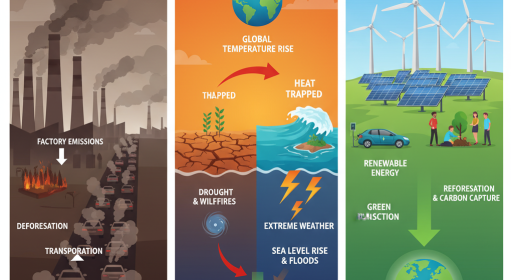Sustainability is a guiding principle aimed at fulfilling present needs without jeopardizing the ability of future generations to meet theirs. This concept underscores the necessity of balancing environmental health, social equity, and economic vitality to foster resilient and thriving communities.
The Three Pillars of Sustainability
Sustainability is often delineated into three interconnected pillars: environmental, social, and economic.
- Environmental Sustainability: Focuses on safeguarding natural resources and ecosystems. This entails practices such as minimizing waste, conserving water and energy, and reducing pollution to ensure the planet’s health and resources are maintained for future generations.
- Social Sustainability: Aims to uphold and enhance social quality, emphasizing aspects like human rights, equity, and community development. It involves fostering accessible healthcare, education, and promoting diversity and inclusion to build a just society.
- Economic Sustainability: Concerns the efficient management of resources to ensure long-term economic health without compromising social and environmental aspects. This includes practices that support economic growth while ensuring fair labor practices and ethical governance.
Importance of Sustainability
Embracing sustainability is crucial for several reasons:
- Preserving Natural Resources: Ensures that essential resources like clean air, water, and fertile soil remain available.
- Mitigating Climate Change: Reduces greenhouse gas emissions and promotes renewable energy sources, contributing to climate stability.
- Enhancing Quality of Life: Leads to healthier communities through improved air and water quality, and equitable access to resources.
- Economic Benefits: Encourages innovation and efficiency, leading to cost savings and new market opportunities.
Practical Examples of Sustainable Practices
Individuals and organizations can adopt various sustainable practices, such as:
- Reducing Single-Use Plastics: Opting for reusable bags, bottles, and containers to minimize plastic waste.
- Energy Conservation: Utilizing energy-efficient appliances and reducing unnecessary energy consumption.
- Sustainable Transportation: Choosing walking, cycling, or public transportation over personal vehicles to decrease carbon emissions.
- Supporting Sustainable Businesses: Patronizing companies that implement eco-friendly practices and offer sustainable products.
By integrating these practices into daily life and business operations, we contribute to a sustainable future that balances ecological integrity, social well-being, and economic prosperity.




